- Home
- Martin Amis
The Information Page 3
The Information Read online
Page 3
Would there be any point, the financier, Sebby, was saying (and his public popularity owed a great deal to this bandied diminutive: never mind, for now, all the fellow sharks and vultures he had left shivering over their visual display units), would there be any point in getting some market research under way? Richard?
"What, reader profile stuff?" He had no idea what to say. He said, "Age? Sex? I don't know."
"I thought we might press a questionnaire on, say… students reading English at London? Something of that kind??
"To see if they like high standards?"
"Targeting," said the male columnist, who was about twenty-eight and experimentally bearded, with a school-dinner look about him. The column the male columnist wrote was sociopolitical. "Come on, this isn't America. Where the magazine market is completely balkanized. Where, you know, they have magazines," he said, already looking round the table to garner any smiles that might soon be cropping up, "for the twice-divorced South Moluccan scuba diver."
"Still, there are more predictable preferences," said the publisher. "Women's magazines are read by women. And men …"
There was a silence. To fill it, Richard said, "Has anyone ever really established whether men prefer to read men? Whether women prefer to read women?"
"Oh please. What is this?" said the female columnist. "We're not talking about motorbikes or knitting patterns. We're talking about literature for God's sake."
Even when he was in familiar company (his immediate family, for instance) it sometimes seemed to Richard that those gathered in the room were not quite authentic selves-that they had gone away and then come back not quite right, half remade or reborn by some blasphemous, backhanded, and above all inexpensive process. In a circus, in a funhouse. All flaky and carny. Not quite themselves. Himself very much included.
He said, "Is this without interest? Nabokov said he was frankly homosexual in his literary tastes. I don't think men and women write and read in exactly the same way. They go at it differently."
"And I suppose," she said, "that there are racial differences too?"
He didn't answer. For a moment Richard looked worryingly short-necked. He was in fact coping with a digestive matter, or at least he was sitting tight until the digestive matter resolved itself one way or the other.
"I can't believe I'm hearing this. I thought we came here today to talk about an. What's the matter with you? Are you drunk?"
Richard turned his senses on her. The woman: gruff, sizable, stalely handsome; and always barging through to her share of the truth. Richard knew the type-because literature knew the type. Like the smug boiler in the Pritchett story, the Labour politician, up North, proud of her brusqueness and her good big bum. The column the female columnist wrote wasn't specifically about being a woman. But the photograph above it somehow needed to have long hair and makeup-for it all to hang together.
The Shadow Minister for the Arts said, "Isn't this what literature is meant to be about? Transcending human difference??
"Hear hear," said the female columnist. "Me? I don't give a damn whether people are male, female, black, white, pink, puce or polka-dotted."
"And that's why you're no good."
"Steady there," said Sebby. And then he added, as if the very appellation refreshed him: "Gwyn."
Everyone turned to him in silence. Gwyn was staring at his coffee spoon with a fascinated frown. He replaced it in its saucer and looked up, his face clearing, his green eyes brightening.
Gwyn said slowly, "I find I never think in terms of men. In terms of women. I find I always think in terms of… people."
There was an immediate burble of approbation: Gwyn, it seemed, had douched the entire company in common sense and plain humanity. Richard had to raise his voice, which meant that his cough kicked in- but he went ahead with his passionate speech.
It was the little rapt pause before the word people: that was what did it.
"A very low-level remark, if I may say so. Hey, Gwyn. You know what you remind me of. A quiz in a color magazine-you know, Are You Cut Out To Be a Teacher? Final question: Would you rather teach (a) history, or (b) geography, or (c) . . . children. Well, you don't get a choice about teaching children. But there is a choice, and a difference, between history and geography. It must make you feel nice and young to say that being a man means nothing and being a woman means nothing and what matters is being a … person. How about being a spider, Gwyn. Let's imagine you're a spider. You're a spider, and you've just had your first serious date. You're limping away from that now, and you're looking over your shoulder, and there's your girlfriend, eating one of your legs like it was a chicken drumstick. What would you say? I know. You'd say: I find I never think in terms of male spiders or in terms of female spiders. I find I always think in terms of… spiders."
Richard sank back, rhythmically sighing or whinnying with all that this had cost him. He didn't have the will to look up, to look up into that unanimity of downward revision. So he stared at the tarnished tablecloth, and saw only the rising-no, the plunging-seahorses that lived behind his eyes.
That evening it was six o'clock by the time Richard got back to Calchalk Street. As he entered (the front door led straight into the sitting room), a crabbed, metallic voice was saying something like,
"Sinister cannot now be opposed in the completion of his evil plan. Our only hope is to confront Terrortron.?
The twins did not look up from the television. Neither did Lizzete, the muscular but very young black girl who collected them from school on Gina's workdays and then watched television with them until Richard returned, or staggered out of his study. She herself wore a school uniform. Lizzete's new boyfriend, on the other hand, got busily to his feet and nodded repeatedly and with his gym-shoed foot tapped Lizzete's muscular calf until she introduced him as Teen or Tine. Short for Tino? Itself short for Martino, Valentino? A well-sprung youth with a core of softness in the kind of black face that would become finely lined rather than sleekly smooth in early middle age. Richard was gratified that his children felt at ease with and even envied black people. When he had met his first black person, the six-year-old Richard, despite much prep-ping and coaching and bribing, had burst into tears.
"Hi boys…"
Side by side on the sofa, with that low, committed gaze, Marius and Marco went on looking at the television, where great slanting hulking cartoon robots fluidly transformed themselves into planes and cars and rockets, like icons in a new socialism of machines.
"Sinister, prepare to meet your doom. Do not think that Hor-rortroid's cohorts can avail you now."
Richard said, "Who christens these characters? How did Hor-rortroid's parents know he was going to be horrible? How did Sinistor's parents know Sinister was going to be sinister?"
"They make up their own names, Daddy," said Marius.
Now Gina was coming through the door, in her suit, in her street pancake. The boys glanced up, and glanced at each other; the room prepared itself for the transfer of power. Richard, with his bow tie askew, was staring at his wife with unusual attention. Her eyes, set in bruised loops of darkness, like badger, like burglar; her nose, a caligulan quarter-circle; her mouth, wide but not full. He was thinking that perhaps all loved faces cover and outreach the visible spectrum-white of tooth, black of brow. Red and violet: the mouth infrared, the eyes ultraviolet. Gina, for her part, was giving Richard her standard stare: she was looking at him as if he had gone mad a long time ago.
They moved into the kitchen for a moment while Lizzete was gathering her things-her bag, her blazer. Gina said,
"Have you got five quid on you? Did you get the job?"
"No. But I have got five quid on me."
Her chest rose in its white shirt. She exhaled. "Bad luck," she said.
"He wasn't ever going to offer me the editorship. For a while it looked like he was going to offer me a job driving a van. Or selling ad space.?
"What are you looking so happy about?"
Richard wanted t
o kiss her. But he wasn't in a position to kiss her. And had not been for some time.
"I'm him," Marius was saying, meaning some robot, the leader of the robot fraternity which stood there potently glittering behind the credits.
"No I'm him," said Marco.
"No you're him" said Marius, meaning some other robot.
"No you're him. I'm him."
"Christ," said Richard, "why can't you both be him?"
And three seconds later Marius's teeth were stuck fast in Marco's back.
Tensely followed by Lizzete, 13 strode the length of lampless Calchalk Street and hoisted himself up into the soiled orange van. He did not immediately slide the door shut after him. Indeed, a single trainer still dangled with pale allure from the brink of the dark cab.
"That's it?" said Lizzete.
13 just smiled at her.
"That's it?"
"Look, I'll take you down the Paradox."
"When?"
"They won't let you in. Thursday."
She pointed a finger at him. "Thursday," she said.
Left in peace, 13 made a move with his hand in the gloom for the last of the Lilts. He pulled off the tab and thirstily tasted the blood-heat crush. There was a book on the seat too. 13 creased his face at it: Crowds and Power. As soon as Lizzete walked away 13's face changed. From that of a cheerful and possibly quite feckless but basically decent black kid, more or less as seen on TV: to the realer face, and a look of unhappy calculation. He was glad he had seen Gina: the wife. At least it was something to tell fucking Adolf. Adolf was Scozzy. Adolf was one of the names Scozzy had that he didn't know about. Others included Psycho and Minder. We all have names we don't know about. For instance, if you have a girlfriend as well as a wife, then your girlfriend will have a name for you that you won't want to hear, a name your girlfriend uses with her girlfriends and her other boyfriends. We all have names we don't know about and don't want to hear.
Now 13 gave a puzzled sigh. He couldn't figure out what was coming down-which wasn't unusual, come to think of it, when you were working for Adolf. There was nothing there anyway apart from the video.
Scozzy was elsewhere. He wouldn't have been along at that time in the evening in any case; but Scozzy was elsewhere. With far from thebest intentions, Scozzy had gone to the hospital to visit an associate. The associate, Kirk, had been savaged, rather seriously, by his own pit bull, Beef. Beef had survived the mishap. Kirk had not had Beef put down. Beef lived on, at Kirk's brother's, Lee's, grimly awaiting Kirk's recovery and return. Forgive and forget, said Kirk. Put it behind you. Kirk argued that he had brought it on himself, plainly overreacting, there in the little kitchen, to Arsenal's embittering defeat, away goals counting double in the event of a draw, at the hands of Dynamo Kiev.
13 adjusted his demeanor to drive to St. Mary's to fetch Scozzy, and then, noticing the time, readjusted it to go home for his tea.
Shame about that. The black kid cannot just be a black kid anymore. Nobody can just be somebody anymore. Pity about that.
Take Richard. This was one of Gina's workdays, so it fell to him to do the boys. The following acts he performed selfconsciously conscientiously (or the other way round): bath, snack, book, fresh water for their jug, Marco's medicines, more book, the two dotlike fluoride pills pressed into their moist mouths, kiss. He kissed the boys as often as he could. His knowledge told him that boys should be hugged and kissed by their fathers-that what fucked men up was not being hugged and kissed by their fathers. Richard had not been hugged and kissed by his father. So he told himself to regard his relationship with his sons as purely sexual. He hugged and kissed them every chance he got. Gina did the same, but she hugged and kissed them because she physically wanted and needed to.
When the boys were done Gina came down in her nightdress and cooked him a lamb chop and ate a bowl of rustic cereal and then went to bed. While they ate, Gina read a travel brochure, in its entirety, and Richard read the first seven pages of Robert Southey: Gentleman Poet, his next book up for review.
Later, heading for his study, where he intended to drink scotch and smoke dope for a couple of hours, and examine his new destiny, he heard an italicized whisper through the half-open door of the boxroom that the boys shared (and were rapidly outgrowing): Daddy. He looked in. Marius.
"What do you want now?"
"Daddy? Daddy: what would you rather be? An Autobot or a Decep-ticon?"
Richard leaned his head against the doorjamb. The twins were being particularly knowing and apposite that night-the twins, with their subtle life, their weave of themes. Earlier in the bathroom Marco had raiseda characteristically crooked finger at a daddy-longlegs on the water pipe. A daddy-longlegs so long-legged that it was almost tripping over itself and made you think of some valiant and tragic sports day for the disabled, all the three-legged races, all the sacks, all the eggs and spoons, all the speeches so nervously prepared and kindly meant. "Daddy? Is that Spiderman?" Daddy with his long legs bent over the bath had answered, "It looks more to me like Spiderspider." … Now Richard said to Marius,
"Autobot or Decepticon. A good question. Like many of your questions. And guess what. I think I've finally made up my mind."
"Which?"
"No more Autobot. All Decepticon."
"Me too."
"Hush now."
Richard sat at his desk in the dark. He rolled and lit; he poured and sipped. Richard was obliged to drink heavily when he smoked dope-to fight the paranoia. To combat the incredible paranoia. On dope he sometimes thought that all the televisions of Calchalk Street were softly crackling about Richard Tull: news flashes about his most recent failures; panel discussions about his obscurity, his neglect. Now he drank and smoked and he was neither happy nor sad.
The really good bit with Gwyn had happened afterwards, in the cab. Half past three, and the light outside, the sky, was the same as the driver's tinted windscreen, the upper half all charcoal and oil, the lower leadenly glowing. Richard pulled the side window down to validate this, and of course the glass surged slowly up again, interposing its own medium. Here perhaps was the only way to see London truly, winging low over it, in a cab, in darkness-at-noon July. London traffic lights are the brightest in the world, beneath their meshed glass: the anger of their red, the jaundice of their amber, the jealousy of their green.
The profile beside him was keeping quiet so Richard said boldly, "Could you believe that woman? You know-she really thinks she's authentic. Whereas . . ." He paused. Whereas to him she had seemed horrifically otherwise. "Unmarried, I assume. She reeked of spinst."
Gwyn turned to him.
"Spinst. Spinst. Like unmarried men reek of batch."
Gwyn turned away again. He shook his head-sadly. You can't say such things. And not just for public reasons. Richard deduced (perhaps wrongly, perhaps over-elaborately) that Gwyn meant something like: You can't say such things because the whole area has been seen to be contaminated-contaminated by men who really do hate women.
(Maybe he had come up with a bad example: with the spiders. People would assume he thought women were spiders. Or that he only hated ?women spiders.) Anyway Richard went ahead and said,
"Great gusts of spinst. A miasma of spinst."
Gwyn waved a hand at him.
"I can describe it for you if you like. Imagine a Wembley of rain-damaged makeup. Or a-"
"Would you pull in at the corner here please?"
No, it was nothing. Gwyn was just buying an evening paper from the boy. Jesus, the light through the open door looked like the end of London, the end of everything; its guttering glow was livid now, and something you wouldn't want to touch, like the human-hued legs of pigeons beneath their dirty overcoats.
The cab resumed its endless journey, its journey of hurry up and wait, hurry up and wait. Gwyn opened his paper and turned to the Diary and eventually said,
"Well there's nothing about it here."
Richard was staring at him. "Nothing about what?"
"A
bout the lunch. Your little outburst."
Richard stared harder. "Relieved about that, are you?"
Gwyn spoke with restraint. He said: "It's quite a while since anybody talked to me like that."
"Is it? Well this time you won't have so long to wait. Because somebody's going to talk to you like that again right away. That's the lunchtime edition. You think the guy just phones it on to the newsstands? It's lucky no one knows how fucking thick you really are. What a fucking dunce you really are. That would be a scoop."
"Nothing about the job offer, either," said Gwyn, his bright eyes still scanning the page.
"There wasn't any job offer."
"Yes there was. While you were off on one of your visits to the toilet. I turned it down of course. I mean, as if I. . ."
The cab pulled up. As Richard hunched forward he said, "One last thing. Why can't I talk about spinst?"
"Because people will start avoiding you."
Now the first drop of rain grayly kissed him on one of his bald spots as he climbed out of the cab and into the shoplit dungeon of Marylebone High Street. Richard went on up to the offices of the Tantalus Press.
Round about here, in time, the emotions lose lucidity and definition, and become qualified by something bodily. Something coarse and coarse-haired in the fury, something rancid and pulmonary in the grief, something toxic and drop-toothed in the hate . . . Richard put his thoughts in delivery order, as a writer might: stuff to be got in. And at the same time he experienced one of those uncovenanted expansions that every artist knows, when, almost audibly to the inner ear, things swivel and realign (the cube comes good), and all is clear. You don't do this: your talent does it. He sat up. His state was one of equilibrium, neither pleasant nor unpleasant in itself, but steady. He gave a sudden nod. Then and there it crystallized: the task. A literary endeavor, a quest, an exaltation-one to which he could sternly commit all his passion and his power. He was going to fuck Gwyn up.

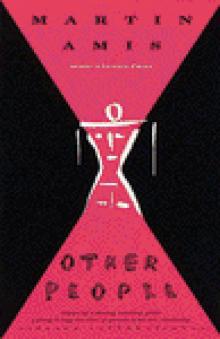 Other People
Other People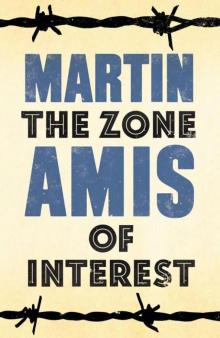 The Zone of Interest
The Zone of Interest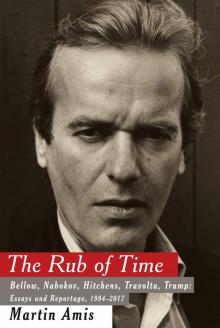 The Rub of Time: Bellow, Nabokov, Hitchens, Travolta, Trump
The Rub of Time: Bellow, Nabokov, Hitchens, Travolta, Trump Koba the Dread
Koba the Dread Success
Success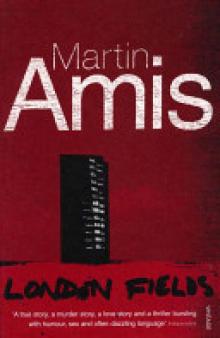 London Fields
London Fields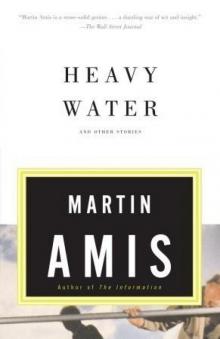 Heavy Water: And Other Stories
Heavy Water: And Other Stories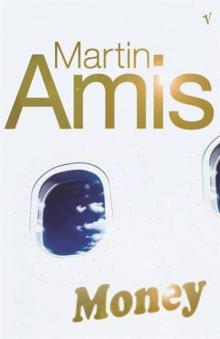 Money
Money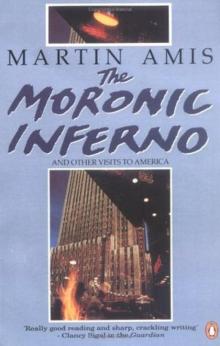 The Moronic Inferno and Other Visits to America
The Moronic Inferno and Other Visits to America Yellow Dog
Yellow Dog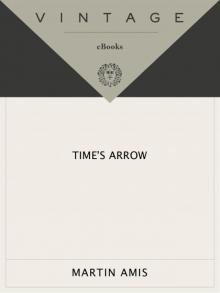 Time's Arrow
Time's Arrow Experience: A Memoir
Experience: A Memoir Einstein's Monsters
Einstein's Monsters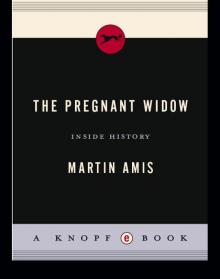 The Pregnant Widow
The Pregnant Widow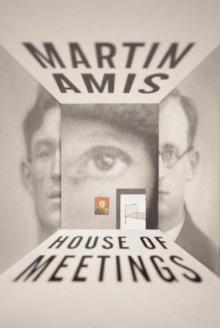 House of Meetings
House of Meetings The Information
The Information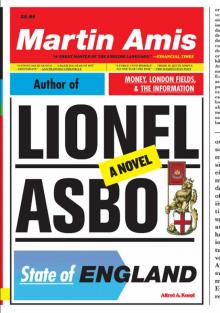 Lionel Asbo: State of England
Lionel Asbo: State of England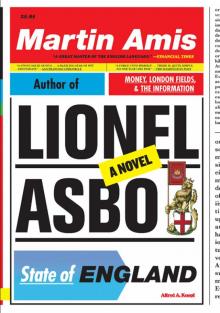 Lionel Asbo
Lionel Asbo Heavy Water and Other Stories
Heavy Water and Other Stories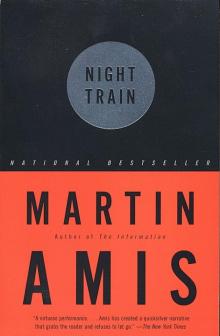 Night Train
Night Train Heavy Water
Heavy Water The War Against Cliche: Essays and Reviews 1971-2000 (Vintage International)
The War Against Cliche: Essays and Reviews 1971-2000 (Vintage International)